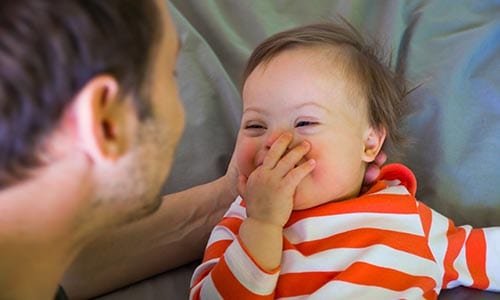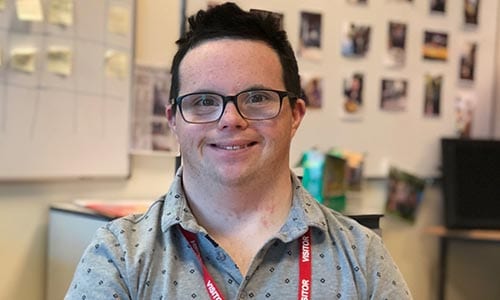The Heart
About half of all children who have Down’s syndrome are born with a heart condition. All children must have a thorough heart examination, including an echocardiogram, by six weeks of age to enable prompt treatment.
Treatment will depend on the type of heart condition. Some require early surgery, some require treatment with medicines, and may need surgery later, and some may not need any treatment, but require close monitoring in case things change. Timely diagnosis and treatment have led to a significant improvement in the health and life expectancy of those who have heart conditions .

About Heart Conditions
Heart conditions can also occur later in life. This may include congenital heart defects that were not picked up in infancy (the person may have been born at a time, or in a country where early screening was not available), further problems in those who had defects corrected in infancy, or new problems that may arise. In the general population, as people age the risk of other heart issues such as hypertension, and coronary heart disease increases.
The same applies for those who have Down’s syndrome, but rates of both these issues seem to be lower. However, people who have Down’s syndrome may be overweight, or have diabetes or thyroid disease, all of which can contribute to heart issues.
Advice on healthy lifestyles, including good diet, taking exercise, and the avoidance of smoking is as important as it is for the general population.
Investigation of those who have never been screened or have new symptoms should be by a cardiac specialist. If at any age a person is showing signs or symptoms that concern you, seek medical advice.
Symptoms suggestive of a heart problem may include breathing difficulties, fatigue, dizziness or faints, or chest pain. There are of course many other causes of all of these.
From adolescence onwards, as part of routine health checks the doctor should listen to the heart for signs of acquired heart disease. The heart should be discussed as part of a thorough Annual Health Check. Everyone who has Down’s syndrome aged 14 years and over is entitled to a free Annual Health Check with their GP.
The Royal College of GPs suggests the following in their guidance for Annual Health Checks for people who have Down’s syndrome:
Cardiovascular
- Auscultation of the heart annually (listening to sounds of the heart)
- A single Echocardiogram should be performed in adult life
- Echocardiogram for new murmurs and signs of cardiac failure
- Adults with a pre-existing structural abnormality should be informed of applicable prophylactic antibiotic protocols
There is further information in our resource ‘Cardiac disorders’. You will find a link to it below. ‘Cardiac’ refers to the heart ‘Cardiology’ is the branch of medicine that deals with issues involving the heart.

International cardiac guidelines project
Initiated by Down Syndrome International, the systematic review and subsequent development of a consensus document (Cardiovascular Complications of Down Syndrome: Scoping Review and Expert Consensus, published in January 2023), has been carried out by clinical experts at the Brompton and other centres in the UK together with experts around the world. The results of this work will help professionals to better understand, diagnose, manage and care for people with Down’s syndrome who have cardiac disease.
The guidance highlights best practice which will lead to better outcomes for people who have Down’s syndrome. The Down’s Syndrome Association is delighted to have been part of this ground-breaking project which will almost certainly save lives.
Resources and useful organisations
Down’s Syndrome Association
DSEngage:
online activities for people who have Down’s syndrome
Our regular, online sessions give people who have Down’s syndrome the opportunity to get active and have fun from their own front rooms.
DSActive
Take a look at our DSActive programme – this is a national programme providing opportunities for people who have Down’s syndrome to lead healthy and active lives by taking part in a wide variety of sporting activities.
Other
Down’s Heart Group
Resources on Down’s Syndrome related heart conditions.
Books Beyond Words
Resources for people who have learning disabilities.
